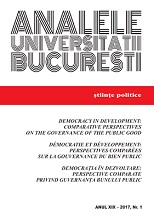Women MPs in Romania: Troubling Patterns, Recent Progress and its Limits
Women MPs in Romania: Troubling Patterns, Recent Progress and its Limits
Author(s): Oana BăluțăSubject(s): Politics / Political Sciences, Politics, Political Sciences, Governance
Published by: Editura Universităţii din Bucureşti
Keywords: women’s political representation; Romanian parliamentary elections; postcommunism
Summary/Abstract: The aim of the paper is to explain and support with electoral data the 8.5% increase in women’s descriptive representation in the 2016 legislative elections in Romania. The change in descriptive representation is even more challenging in a political context that is highly resistant to gender representation and gender quotas. My intention is to elaborate an argument grounded in a larger opportunity structure that opened doors for a better descriptive representation of women, although an unintended one. I begin with a critical reflection on literature and research addressing political representation in Romania and Central and Eastern Europe in order to strengthen that new avenues need to be embraced by scholars, avenues that both question the adequacy of explanation patterns and later on operationalize in specific contexts the findings of better researched countries. Then I offer a descriptive depiction of data from the 2017 parliamentary elections to explain the 8.5% increase in descriptive representation. The data used is based on results published by the electoral Central Electoral Office, the institution centralizing electoral information. The data was coded according to gender, political party, ethnic minorities groups, incumbent and new comer status. There is substantial gender inequality in party practices and the increase in descriptive representation is not simply lists but a changed opportunity structure. I argue here that there is an apparent anomaly of recent Social Democratic Party (PSD) gender progress, that “progress” is conjunctural rather than a function of ideology, that the PSD’s support for traditional values offers evidence that it is conjunctural, and not due to a commitment to gender equality. In spite of this most recent change in descriptive representation, many obstacles remain and the increase should be carefully considered in a wider context before considering it a benchmark of any substantial commitment for gender equality.
Journal: Analele Universităţii din Bucureşti. Seria Ştiinţe Politice
- Issue Year: XIX/2017
- Issue No: 1
- Page Range: 29-64
- Page Count: 36
- Language: English

